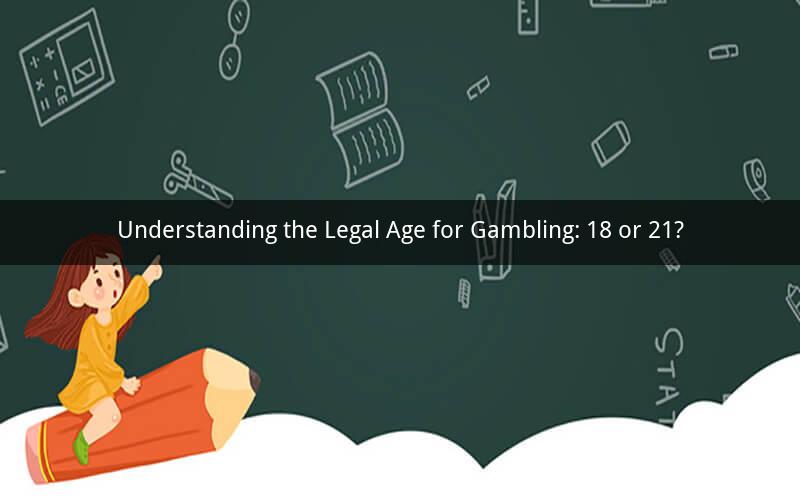
Introduction:
The topic of legal gambling age has sparked numerous debates across the globe. Many countries have different laws regarding the minimum age at which individuals can legally participate in gambling activities. In some regions, the legal age is set at 18, while in others, it is 21. This article delves into the reasons behind these varying ages and examines the implications of each.
Section 1: The Legal Age for Gambling in Different Countries
1.1 United States
In the United States, the legal gambling age varies by state. Some states have set the minimum age at 18, while others have raised it to 21. For instance, in Nevada, the legal age for gambling is 21, but in Delaware, it is 18.
1.2 United Kingdom
In the United Kingdom, the legal age for gambling is 18. This includes both land-based and online gambling. The Gambling Act of 2005 established this minimum age, making it legal for individuals to gamble at 18.
1.3 Australia
Australia has a more complex legal framework for gambling. The minimum age for gambling varies by state and territory. For example, in New South Wales, the legal age is 18, while in South Australia, it is 18 for land-based gambling and 21 for online gambling.
1.4 Canada
In Canada, the legal age for gambling is also 18. However, provincial governments have the authority to set their own minimum ages, which can result in some variations.
1.5 South Africa
In South Africa, the legal age for gambling is 18. This includes both land-based and online gambling.
Section 2: Reasons for Different Legal Ages
2.1 Historical and Cultural Factors
The legal age for gambling is influenced by historical and cultural factors. In some countries, such as the United States, the legal age was initially set at 18 due to the belief that individuals at this age were mature enough to make responsible decisions. However, as the years passed, concerns about the potential risks associated with gambling led to an increase in the legal age to 21 in some states.
2.2 Public Health and Safety Concerns
One of the primary reasons for setting a minimum legal age for gambling is to protect public health and safety. By restricting gambling to individuals of a certain age, governments aim to reduce the risk of addiction, financial problems, and other negative consequences associated with gambling.
2.3 Economic Considerations
Another factor influencing the legal age for gambling is the potential economic impact. By setting a minimum age, governments can ensure that individuals participating in gambling activities have the financial means to support their own gambling habits without causing financial strain on others.
Section 3: Implications of Different Legal Ages
3.1 Public Safety
Having a minimum legal age for gambling can help protect vulnerable populations, such as minors, from the potential harms associated with gambling. By ensuring that individuals are of legal age, governments can reduce the risk of underage gambling, which can lead to addiction, financial problems, and other negative consequences.
3.2 Tax Revenue
By setting a minimum legal age for gambling, governments can also generate significant tax revenue. This revenue can be used to fund various public services and programs, such as education, healthcare, and infrastructure.
3.3 Industry Regulation
A minimum legal age for gambling can also help ensure that the gambling industry is regulated and operated responsibly. By requiring individuals to be of legal age, governments can enforce regulations and prevent illegal gambling activities.
Section 4: The Debate on Legal Age for Gambling
4.1 Proponents of 18-Year-Old Legal Age
Proponents of setting the legal age for gambling at 18 argue that individuals at this age are mature enough to make responsible decisions. They believe that by allowing individuals to gamble at 18, governments can generate more tax revenue and promote economic growth.
4.2 Opponents of 18-Year-Old Legal Age
Opponents of setting the legal age for gambling at 18 cite concerns about the potential risks associated with underage gambling. They argue that raising the legal age to 21 would better protect vulnerable populations and reduce the likelihood of addiction and other negative consequences.
Section 5: Conclusion
The legal age for gambling varies across different countries and regions, with some setting it at 18 and others at 21. The reasons behind these varying ages include historical and cultural factors, public health and safety concerns, and economic considerations. While setting a minimum legal age for gambling can help protect vulnerable populations and generate tax revenue, the debate on the appropriate legal age for gambling continues to this day.
Questions and Answers:
1. Q: Why is the legal age for gambling different in various countries?
A: The legal age for gambling varies due to historical, cultural, and regulatory factors unique to each country or region.
2. Q: What are the potential risks associated with underage gambling?
A: Underage gambling can lead to addiction, financial problems, and other negative consequences, such as mental health issues and criminal activity.
3. Q: How does the legal age for gambling affect tax revenue?
A: By setting a minimum legal age for gambling, governments can generate significant tax revenue, which can be used to fund public services and programs.
4. Q: Can raising the legal age for gambling reduce addiction rates?
A: Raising the legal age for gambling may help reduce addiction rates by protecting vulnerable populations from the potential risks associated with gambling.
5. Q: What is the impact of legal gambling age on the gambling industry?
A: The legal gambling age can help ensure that the gambling industry is regulated and operated responsibly, which can protect consumers and promote fair play.